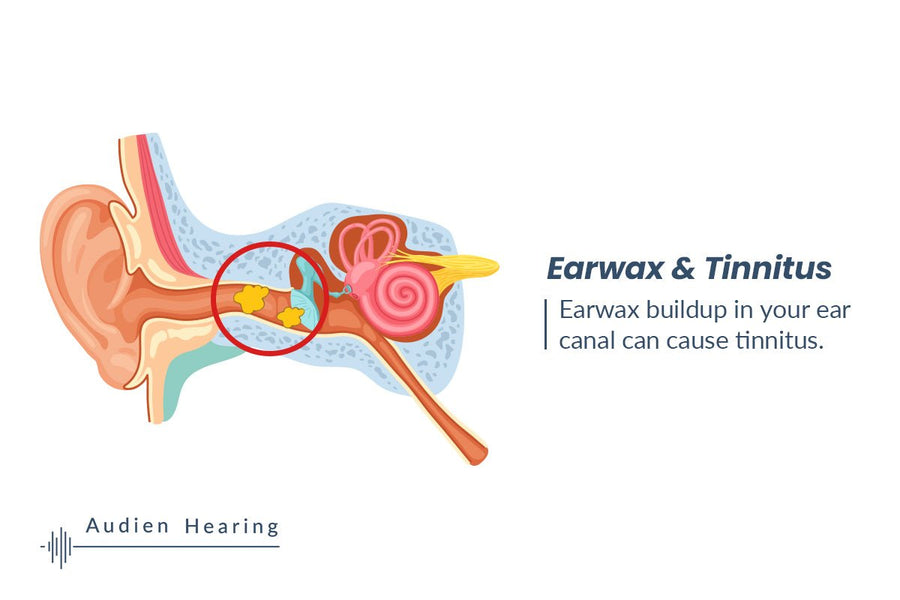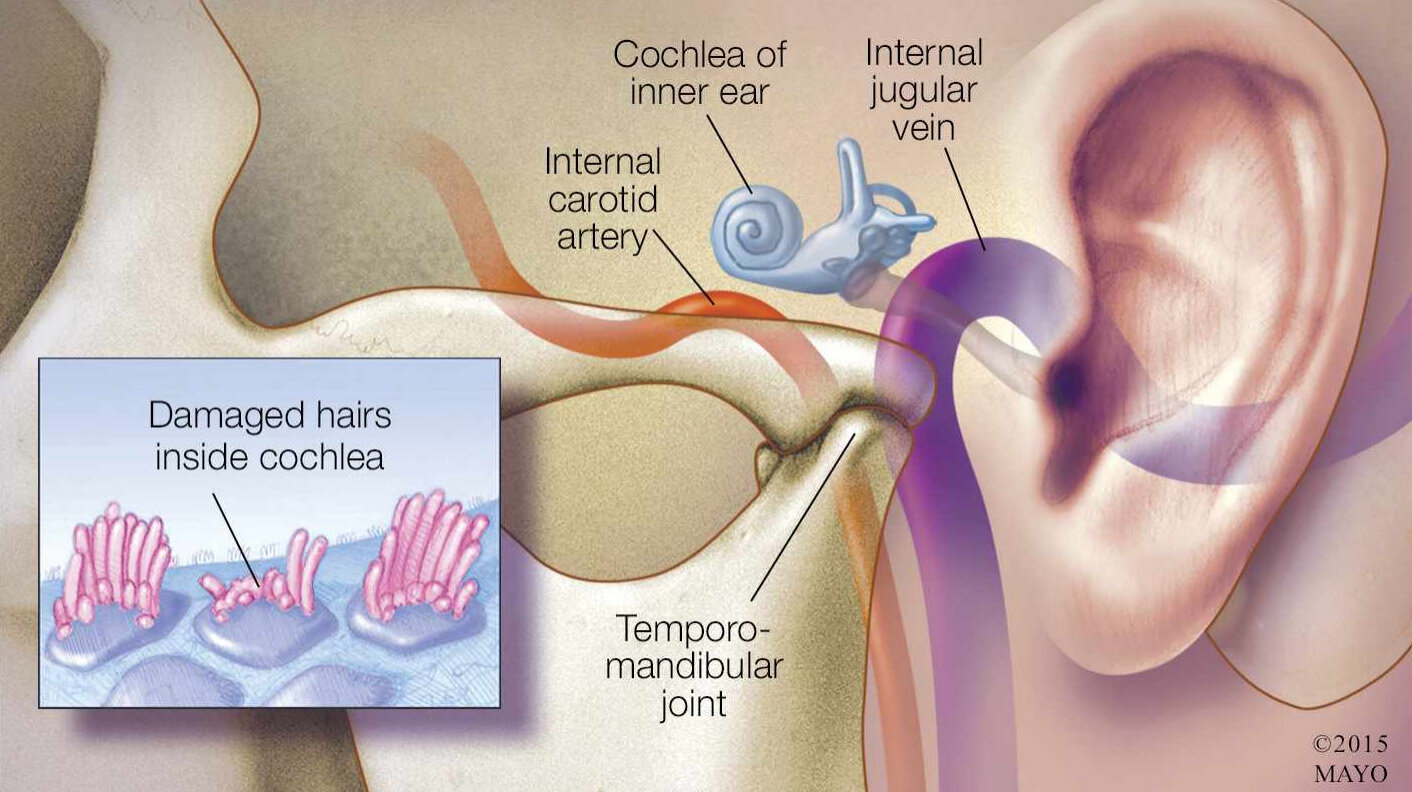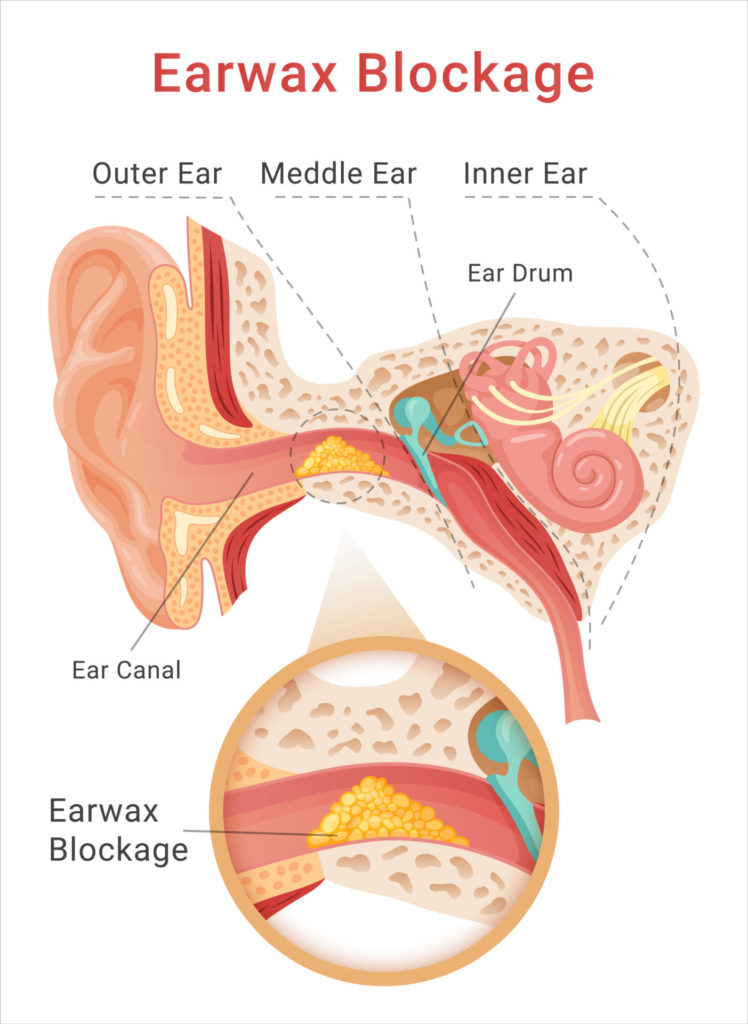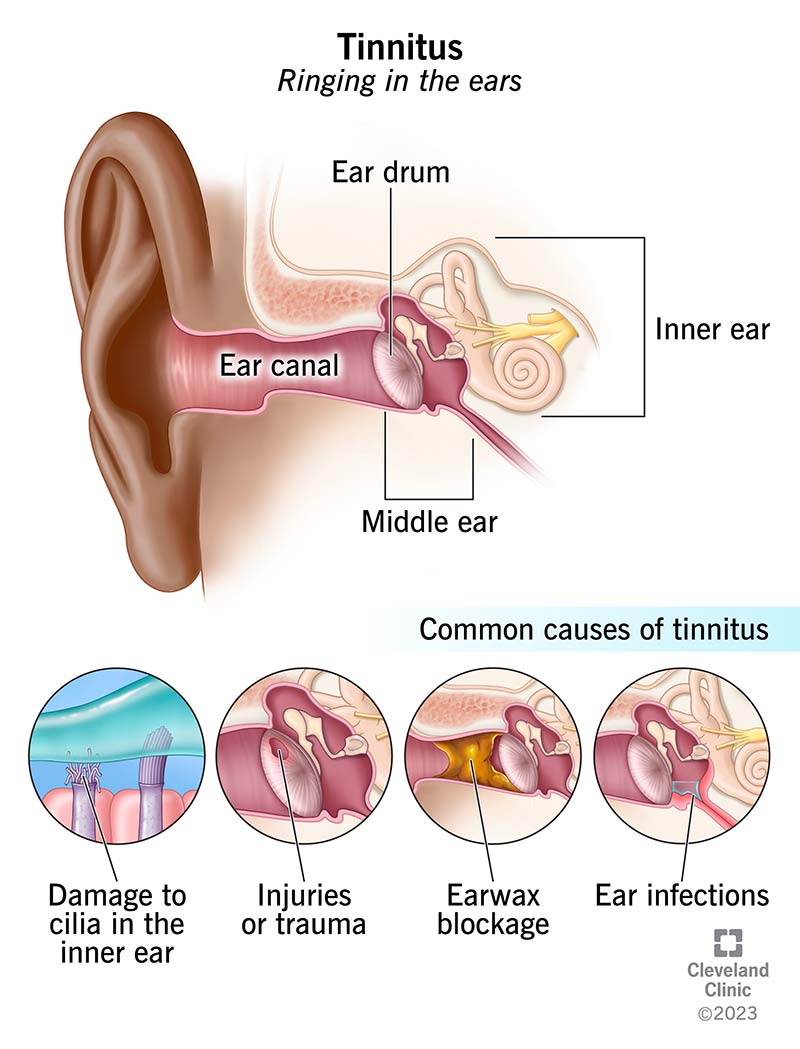Tinnitus From Ear Wax-various aspects-
Yes, the accumulation of earwax, or cerumen impaction, can lead to tinnitus (ringing in the ears) as the obstruction may disrupt sound transmission and possibly irritate the ear nerves.


Here’s a more detailed explanation:
How it happens:
When earwax builds up and hardens, it can block the ear canal, resulting in a feeling of fullness in the ear, hearing impairment, and occasionally tinnitus.
Mechanism:
The blockage can disrupt the normal vibrations of the eardrum and auditory ossicles (the bones in the middle ear), which can result in tinnitus.
Other symptoms:
In addition to tinnitus, impacted earwax might also lead to ear discomfort, itching, dizziness, and a sensation of fullness in the ears.
Treatment:
If you believe that earwax is the cause of your tinnitus, talk to a healthcare professional for safe and effective removal of the earwax.
Home remedies:
If advised by your doctor, you might try softening the wax with warm mineral oil or hydrogen peroxide diluted with water.
When to see a doctor:
If you experience severe or ongoing tinnitus, sudden loss of hearing, ear pain, or if home remedies fail, seek medical consultation.
Is there a link between tinnitus and earwax?/ Tinnitus From Ear Wax
Tinnitus is one of several issues that can arise from earwax buildup in the ear canal. But how do earwax and tinnitus relate to one another, and can tinnitus be brought on by earwax removal techniques?
To understand the subject completely it is essential not only to go through this article but also click on the you tube video link given at the bottom of this article .
Tinnitus
Tinnitus can have a variety of causes, which makes it challenging for some people to figure out why they are experiencing it. Some people’s tinnitus is caused by hearing loss brought on by noise. Others may experience ringing in their ears as a result of a disease or medication. Tinnitus, however, can also be brought on by another factor that is commonly disregarded. If you’ve only recently started experiencing tinnitus, your ear canal may be the source of your issues.
Earwax and tinnitus-Tinnitus From Ear Wax
The ear’s glands create cerumen, often known as earwax. This fluid traps dirt to protect the interior of your ear, and it should normally exit your ear on its own. Only the occasional wipe of the outer ear with a wet rag is required for cleaning. Pushing items like cotton swabs and bobby pins into the ear can quickly go awry and cause severe discomfort and damage.
While the majority of people don’t have any issues with earwax, some people do. There may be a number of causes for this development of cerumen in the ear. Earwax can be pushed back into the ear canal by cotton swabs and earphones, resulting in a blockage. Those who create dry cerumen may experience accumulation more frequently.
Tinnitus frequently coexists with impaction in patients. This loud ringing, which may only happen in the affected ear, can irritate people and make it difficult to concentrate. Check to see if you don’t also have a blockage if you’ve been experiencing tinnitus.
Impaction symptoms of Tinnitus From Ear Wax
Tinnitus is one of the symptoms associated with impaction. Common symptoms of earwax obstruction in the ear due to Tinnitus From Ear Wax include hearing loss, earaches, ear congestion, and dizziness. Moreover, odour and discharge are possible. You should make an appointment with your doctor or a hearing care professional to address this issue.
Methods for removing earwax are not intended for use at home and should never be performed by anyone other than a specialist. However, the issue should be evaluated as soon as possible. Earwax-softening drops can be used to reduce pain and pressure.
Ear wax blockage therapy – in relation to Tinnitus From Ear Wax
Impactions caused by earwax can be removed using a variety of techniques. All of them should only be attempted by a skilled practitioner because they could all be harmful if done carelessly.
The first is the most often used technique, microsuction. A little suction device is used to remove the earwax after a microscope is used to magnify the interior of the ear canal. The majority of people choose this approach, and many contend that it is the most secure way to handle impacts.
Irrigation is another technique, for Tinnitus From Ear Wax although there is frequently debate over it. This technique makes use of a tiny water pick. People with diabetes, compromised immune systems, and those who have holes or tubes in their eardrums should never undergo this procedure. Since many people claim that this practise makes their tinnitus worse, those who already have the condition should also refrain from irrigation.
the risks of using poor methods for Tinnitus From Ear Wax
Online, you might find irrigation kits, but you shouldn’t use them. Candles and water picks are just two at-home remedies that can seriously harm your eardrum and inner ear. Never attempt to take out an impaction on your own. A cotton swab used improperly can push earwax deeper, damage the eardrum, and result in significant tinnitus and hearing loss.
Blockage of the ear canal due to earwax or fluid resulting from an ear infection can initiate tinnitus. Injuries to the head or neck. An injury to the head or neck may harm the ear’s structures, the nerve that transmits sound signals to the brain, or parts of the brain that interpret sound, leading to tinnitus.
Describe tinnitus-in relation to Tinnitus From Ear Wax
It is necessary to understand tinnitus ,before understanding Tinnitus From Ear Wax
Tinnitus, which is pronounced “tih-NITE-us” or “TIN-uh-tus,” is the perception of sound that has no external source and cannot be heard by other people.


Although ringing is the most common sound associated with tinnitus, some people also experience buzzing or roaring noises. According to polls, 10 to 25% of adults suffer from tinnitus. Tinnitus can also affect children. Tinnitus in kids and adults may become better or even go away with time, but occasionally it gets worse. Tinnitus is regarded as chronic when it persists for three months or more.
Tinnitus’s causes are unknown .Tinnitus From Ear Wax is just only one reason , however, the majority of sufferers also have some degree of hearing loss. Rarely are serious medical conditions linked to tinnitus, and most cases don’t last long enough to affect daily life. However, some people discover that it interferes with their mood, sleep, or concentration. Tinnitus can cause anxiety or depression in extreme circumstances.
There is currently no treatment for tinnitus; however, there are techniques to lessen the symptoms. Utilising sound therapy equipment, such as hearing aids, behavioural therapies, and medications, is a common approach.
What signs do you have of tinnitus? -in relation to Tinnitus From Ear Wax
Tinnitus symptoms might differ greatly from person to person. Phantom sounds could be heard in your head, in one ear, or in both. The phantom sound can roar, whistle, click, hiss, or screech. It can also ring or buzz. The sound could be high or low-pitched, gentle or loud. It might appear and disappear or always be there. Sometimes, moving your head, neck, or eyes, as well as touching specific body parts, can cause tinnitus symptoms or momentarily alter the perceived sound. Somatosensory tinnitus is the term for this condition (pronounced so-ma-toe-SENSE-uh-ree).
The sounds in the majority of tinnitus cases are subjective, which means that only you can hear them. The sound occasionally pulses regularly and is frequently timed to your heartbeat. If a clinician can detect the noises in these situations using a stethoscope, it is thought to be objective tinnitus. Objective tinnitus is frequently curable and has a known aetiology.
Why does tinnitus occur?-in relation to Tinnitus From Ear Wax
Although the precise reasons for tinnitus are still not fully understood, the following have been associated with it:-
Besides tinnitus from ear wax tinnitus can occur due to other reasons also-
Exposed to noise. Many people develop tinnitus after being exposed to loud noise at a sporting event, concert, or in the workplace. Because of the tremendous noise that they may have endured from gunfire, machinery, bomb blasts, or other comparable sources, tinnitus is also the most prevalent service-related disability among veterans.
loss of hearing. Tinnitus is closely related to hearing loss, which can be brought on by conditions including ageing or exposure to loud noise. But some people who have hearing loss never get tinnitus.
Medications. Some medications, especially those taken in high doses, can cause tinnitus as a side effect. Besides tinnitus from ear wax , tinnitus can occur due to other causes also .Non-steroidal anti-inflammatory drugs (such as ibuprofen, naproxen, and aspirin), specific antibiotics, anti-cancer treatments, anti-malaria therapies, and antidepressants are among the pharmaceuticals linked to tinnitus.
Either ear wax or an infection. Tinnitus can be brought on by earwax or fluid from an ear infection blocking the ear canal.
neck or head trauma. Tinnitus can be brought on by head or neck injuries that harm the ear’s tissues, the nerve that transmits sound signals to the brain, or the parts of the brain that process sound.
Any patient with complains of ear wax/tinnitus may contact ENT specialist doctor Dr Sagar Rajkuwar (MS-ENT) at the following adress-
Prabha ENT clinic, plot no 345,Saigram colony, opposite Indoline furniture ,Ambad link road ,Ambad ,1 km from Pathardi phata Nashik ,422010 ,Maharashtra ,India -Dr Sagar Rajkuwar (MS-ENT), Cel no- 7387590194,9892596635
FOR FURTHER INFORMATION IN GREAT DETAIL ON PL CLICK ON Ear Wax Cleaning Machine THE LINK GIVEN BELOW-It is always better to view links from laptop/desktop rather than mobile phone as they may not be seen from mobile phone. ,in case of technical difficulties you need to copy paste this link in google search. In case if you are viewing this blog from mobile phone you need to click on the three dots on the right upper corner of your mobile screen and ENABLE DESKTOP VERSION.
FOR FURTHER INFORMATION IN GREAT DETAIL ON PL CLICK ON Clear Wax Ear Drop Uses In Hindi THE LINK GIVEN BELOW-It is always better to view links from laptop/desktop rather than mobile phone as they may not be seen from mobile phone. ,in case of technical difficulties you need to copy paste this link in google search. In case if you are viewing this blog from mobile phone you need to click on the three dots on the right upper corner of your mobile screen and ENABLE DESKTOP VERSION.
For update on further important health related topics and frequently asked questions on health topics by general population please click on the link given below to join our WhatsApp group –
https://chat.whatsapp.com/Lv3NbcguOBS5ow6X9DpMMA
Issued in public interest by –
www.entspecialistinnashik.com
Tinnitus From Ear Wax– in relation to Tinnitus From Ear Wax
Yes, excessive earwax buildup can indeed contribute to tinnitus, or ringing in the ears. When earwax becomes impacted, it can block the ear canal, leading to a variety of symptoms, including tinnitus, hearing loss, and a feeling of fullness in the ear.


Here’s why earwax buildup might cause tinnitus:
Blockage of the ear canal:
Excessive earwax can block the ear canal, interfering with the transmission of sound waves to the inner ear, which can be interpreted by the brain as a ringing or buzzing sound.
Increased pressure:
The buildup of earwax can create pressure in the ear canal, which can impact the eardrum and inner ear structures, potentially triggering tinnitus.
Irritation of the ear canal:
Excessive earwax can irritate the delicate skin lining the ear canal, and this irritation can sometimes lead to tinnitus.
If you suspect earwax buildup is causing your tinnitus, it’s important to consult with a healthcare professional for proper diagnosis and removal of the impacted earwax.
Can Earwax cause tinnitus?– in relation to Tinnitus From Ear Wax


What are the underlying causes of tinnitus brought on by earwax?
Ear wax can cause tinnitus for a variety of reasons, but ultimately the nerves in your canal are the source of the problem.
It’s crucial to understand that tinnitus isn’t a condition. Tinnitus is a symptom that points to an issue with your auditory system. This encompasses the auditory nerve, which links the inner ear to the brain, as well as the regions of the brain that process sound, like the auditory cortex.
When ear wax builds up and becomes stuck, the pressure in your ear canal can excite your nerves.
As a result, your mind may perceive this nerve activity as evidence that a sound is present. The brain could attempt to make up for this by creating fictitious internal noises!
Earwax-related tinnitus usually results from:
An Obstruction or Impaction: The obstruction of the ear canal is a typical cause of tinnitus associated with earwax. Earwax may accumulate and harden, blocking the channel and causing ear fullness, hearing loss, and occasionally ringing in the ears. The obstruction can disrupt the normal vibration of the eardrum and auditory ossicles, or bones in the middle ear, which can cause tinnitus.
Ear infections can result from earwax accumulation, which can trap bacteria and fungi in the ear canal. These infections can result in swelling and fluid accumulation in the middle ear, which can impair hearing and, in some cases, produce tinnitus.
Changes in Pressure: A buildup of earwax might put pressure on the eardrum, impairing its capacity to vibrate correctly. This change in pressure has the potential to disrupt the usual hearing process and cause tinnitus-related symptoms.
What do the specialists say?– in relation to Tinnitus From Ear Wax
“Removing earwax is frequently a crucial component in treating tinnitus,” Lindsay Fletcher stated. When earwax builds up to the point where it affects hearing, it might also cause you to hear phantom ringing or buzzing noises. We use our microsuction method to thoroughly clear the ear canal, which not only brings back hearing clarity but also helps many people with the bothersome symptoms of tinnitus. It’s a basic but incredibly successful intervention.
Keep in mind that tinnitus can be brought on by a variety of medical disorders, such as an excess accumulation of earwax.
- Infections of the sinus and ear
- noise-induced hearing loss
- ailments of the heart or blood vessels
- Ménière’s illness
- Tumors in the brain
- Issues with the thyroid
- Alterations in hormones in women
- Some drugs cause this as a side effect.
One of the first symptoms of hearing loss is frequently tinnitus. Tinnitus can develop over time for those who work in noisy environments, like musicians or construction workers. The sensory hair cells in the inner ear, which send sound waves to the brain, are continually damaged by noise exposure, which is why this happens. One of the most prevalent illnesses among military personnel returning from the wars in Afghanistan and Iraq is tinnitus.
Although there are several possible causes of tinnitus, some individuals get the illness for no apparent cause. Fatigue, sadness, and anxiety may result from an overpowering and continuous sound. The likelihood of developing a more severe health problem may be reduced by early diagnosis of tinnitus. If tinnitus is caused only by ear wax buildup, it can be treated swiftly and effectively, thus it is crucial to rule out this possibility-for related youtube video on this topic please click on the link given below-https://youtu.be/yeap2PUoVrg
-FOR FURTHER INFORMATION IN GREAT DETAIL Tinnitus with Ear Infection PL CLICK ON THE LINK GIVEN BELOW-It is always better to view links from laptop/desktop rather than mobile phone as they may not be seen from mobile phone. ,in case of technical difficulties you need to copy paste this link in google search. In case if you are viewing this blog from mobile phone you need to click on the three dots on the right upper corner of your mobile screen and ENABLE DESKTOP VERSION-
-FOR FURTHER INFORMATION IN GREAT DETAIL Tinnitus Disability PL CLICK ON THE LINK GIVEN BELOW-It is always better to view links from laptop/desktop rather than mobile phone as they may not be seen from mobile phone. ,in case of technical difficulties you need to copy paste this link in google search. In case if you are viewing this blog from mobile phone you need to click on the three dots on the right upper corner of your mobile screen and ENABLE DESKTOP VERSION-
-FOR FURTHER INFORMATION IN GREAT DETAIL Tinnitus and Headache PL CLICK ON THE LINK GIVEN BELOW-It is always better to view links from laptop/desktop rather than mobile phone as they may not be seen from mobile phone. ,in case of technical difficulties you need to copy paste this link in google search. In case if you are viewing this blog from mobile phone you need to click on the three dots on the right upper corner of your mobile screen and ENABLE DESKTOP VERSION-
-FOR FURTHER INFORMATION IN GREAT DETAIL Tinnitus Pulsatile PL CLICK ON THE LINK GIVEN BELOW-It is always better to view links from laptop/desktop rather than mobile phone as they may not be seen from mobile phone. ,in case of technical difficulties you need to copy paste this link in google search. In case if you are viewing this blog from mobile phone you need to click on the three dots on the right upper corner of your mobile screen and ENABLE DESKTOP VERSION-
-FOR FURTHER INFORMATION IN GREAT DETAIL Does ear infection tinnitus go away? PL CLICK ON THE LINK GIVEN BELOW-It is always better to view links from laptop/desktop rather than mobile phone as they may not be seen from mobile phone. ,in case of technical difficulties you need to copy paste this link in google search. In case if you are viewing this blog from mobile phone you need to click on the three dots on the right upper corner of your mobile screen and ENABLE DESKTOP VERSION-
-FOR FURTHER INFORMATION IN GREAT DETAIL Tinnitus treatment PL CLICK ON THE LINK GIVEN BELOW-It is always better to view links from laptop/desktop rather than mobile phone as they may not be seen from mobile phone. ,in case of technical difficulties you need to copy paste this link in google search. In case if you are viewing this blog from mobile phone you need to click on the three dots on the right upper corner of your mobile screen and ENABLE DESKTOP VERSION-
-FOR FURTHER INFORMATION IN GREAT DETAIL Tinnitus with ear infection-latest updates PL CLICK ON THE LINK GIVEN BELOW-It is always better to view links from laptop/desktop rather than mobile phone as they may not be seen from mobile phone. ,in case of technical difficulties you need to copy paste this link in google search. In case if you are viewing this blog from mobile phone you need to click on the three dots on the right upper corner of your mobile screen and ENABLE DESKTOP VERSION-









